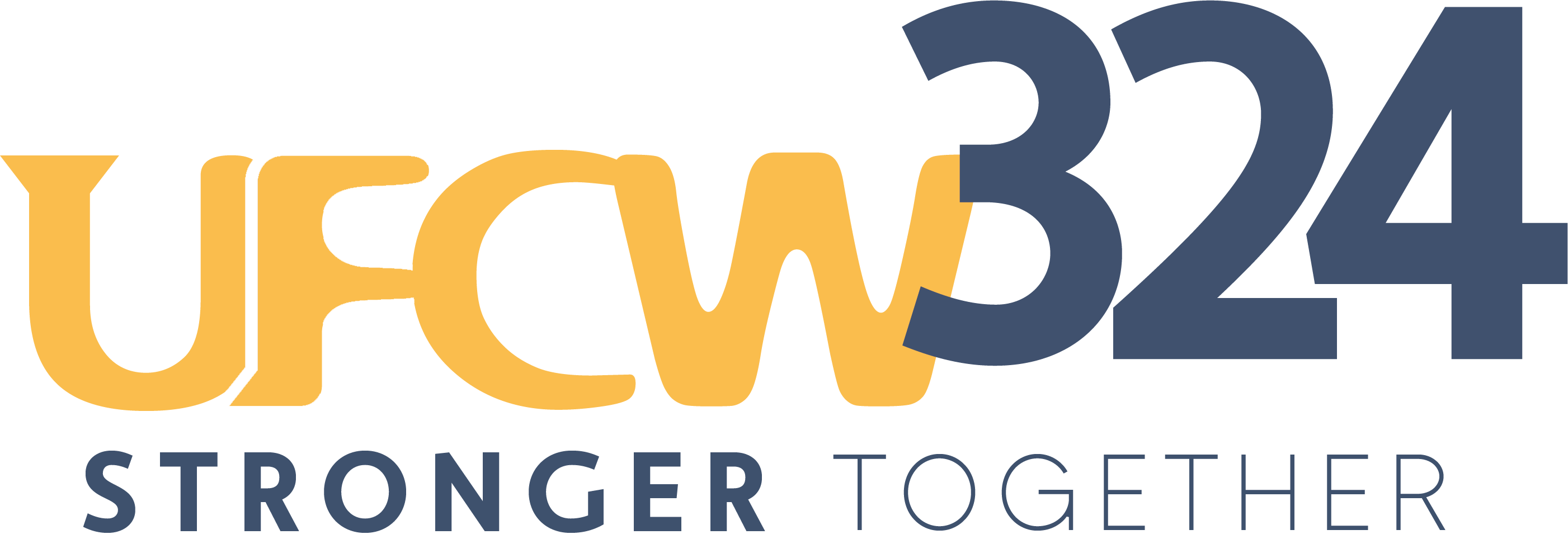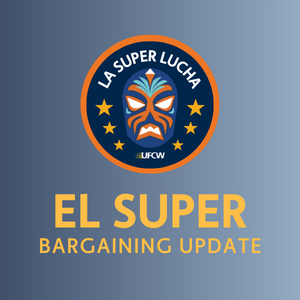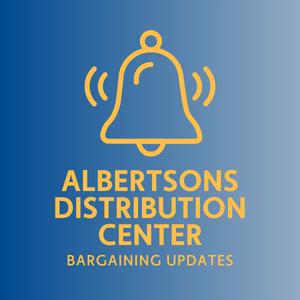Food 4 Less Contract FAQ
FOOD 4 LESS CONTRACT FAQs
From the thousands of petition signatures collected from workers to the hundreds of people who have attended rallies at Food 4 Less stores this Spring, Food 4 Less workers in Southern California are stronger than ever and Food 4 Less and their parent company Kroger see that.
Now they are resorting to tired tactics from an old playbook to confuse us and divide us. They know that if we continue to stand together, they will have no choice but to give us the contract we deserve. Member participation is essential in all actions to continue to show Kroger that Food 4 Less workers are willing to fight and strike, if necessary, for a fair contract that respects our work and our essential role in our communities.
While we don’t want to strike, we will take any action available to us to obtain a fair contract, and a strike is one of the many tools we have to give us the leverage we need to win. A strike is always the last resort, but workers must be prepared to walk out if it comes to that. The best way to avoid a strike is for Kroger and Food 4 Less to truly believe their workers will strike.
Below are some frequently asked questions we are hearing from our members:
What does it mean if/when our contract expires without reaching an agreement on a new one?
An expired contract DOES NOT MEAN WE ARE ON STRIKE. All contract provisions/protections remain in place while we are negotiating, including your health insurance. You should continue to go to work according to your work schedule until an official representative of the union notifies you that a strike impacting your store has started. It’s very important to stay in touch with your steward and union rep who will be communicating information to members in the stores about actions and next steps in real time. IF YOU WALK OFF THE JOB BEFORE THE UNION DECLARES A STRIKE, YOU CAN BE DISCIPLINED AND/OR FIRED.
Will there be a contract extension?
The bargaining team has made the strategic decision that we will not agree to a contract extension because a contract extension would prevent our ability to go on strike. We want to have all the tools available to continue to fight for a fair contract. Kroger has made millions of dollars in profits while union workers faced the worst of a global pandemic. Our members are essential and deserve a fair contract that gives them equity with other grocery stores, wages that allow them to raise a family, and safer staffing. We demand that the company continue to bargain until an agreement is reached.
What is an unfair labor practice (ULP)?
A ULP is when the company interferes with or discriminates against workers for their union activities. This violates federal labor law. Examples of a ULP include not allowing you to wear buttons, filming or keeping an eye on you at union actions, or otherwise retaliating against you for union activity. On May 22, we filed Unfair Labor Practice charges against Food 4 Less for allegedly discriminating against employees based on union activity, prohibiting employees from participating in union activity, monitoring employees engaging in union activity, and unilaterally changing our contract without bargaining. We contend that these actions by the company are unlawful and we will not be intimidated by their threats.
What is a ULP strike?
A ULP strike is when workers walk off the job and/or do not go to work per their scheduled shift to protest unfair labor practices the company has allegedly committed. Strikes are most effective when all employees in a struck location refuse to go to work.
Would my job be protected while on a ULP strike?
Employees who strike to protest an unfair labor practice committed by their employer are called unfair labor practice strikers. When the strike ends, unfair labor practice strikers, absent serious misconduct on their part, are entitled to have their jobs back even if employees hired to do their work have to be discharged. (source: https://www.nlrb.gov/strikes)
What has to happen for us to strike?
- Three steps must be taken before we can legally strike: The contract must expire or otherwise not be in effect
- At least two-thirds of the workers in the Southern California bargaining unit who participate in the vote must vote to authorize negotiators to call a strike
- The negotiators (union leaders and workers on the bargaining committee) must decide WHEN to strike in order to make it most effective.
A Union representative will notify workers it is time to walk out on the line.
AGAIN: DO NOT WALK OUT UNTIL YOUR UNION NOTIFIES YOU. If you walk out before that, you could be disciplined and/or fired by your employer.
How is an unfair labor practice strike different from an economic strike?
A strike to win higher wages or improve working conditions is classified as an “economic strike.” The strike Southern California grocery workers at Vons went through in 2003-2004 was an economic strike. Striking to protest unfair labor practices (unlike an economic strike) means that workers can not be permanently replaced. In addition, workers can return to work without a contract being approved. Previously, in Colorado, UFCW members conducted successful ULP strikes that lasted for two weeks and that helped them win a strong contract.
Will we receive pay while on strike?
The union has a strike fund that pays a benefit to striking workers. All classifications except utility clerks will get a benefit of $130 per day. Utility clerks will receive $100 per day.
Would I lose my benefits/insurance if we go on strike?
As long as you worked the required hours (64 for utility clerks and 76 for everyone else) during the months before going on strike, your health coverage extends through the next two months. The union and the company can bargain a strike settlement agreement that can ensure there is no gap in coverage.
* Because UFCW members fought hard and advocated for a bill in Sacramento, locked out or striking workers now have access to Covered California if they lose their health insurance because of a labor dispute.
If we go on strike, how long would we be on strike?
Nobody can predict how long we would be on strike. UFCW Local 7 in Colorado was on strike for 10 days, in Oregon the grocery workers’ strike was only 36 hours. ULP strikes can be for a set period of time. If we go on strike, our union leaders and bargaining committee will determine the length that is most strategic for us to be out in order to win the contract we deserve.
What will happen to members who cross the picket line if we go on strike?
Strikes are hard on everyone, but they’re only effective when ALL the members remain united and demand the companies treat their employees with dignity and respect. When members cross the picket line they are letting the companies know the members are divided. Ultimately this will result in a weaker contract. The UFCW 324 Executive Board has the authority to determine if and what actions may be taken against scabs.
What happens if members simply stay home? (Don’t walk the picket line but don’t go to work)
Again, strikes are most effective when ALL workers remain united and show the companies our power. When workers don’t walk the picket line that sends a message to the company that we are not united and may result in a weaker contract.
Can they close the store, fire us, and then reopen as non-union?
The companies may threaten this as a scare tactic to discourage workers from going on strike. This is a violation of national labor law. The companies make their decisions about where to open and close stores based on how profitable they are and we know that Food 4 Less stores in our area are some of the most profitable-per-worker for Kroger. Previously, UFCW members in Oregon and Colorado went on strike to win a fair contract and the companies did not close stores.
Do I keep my same job classification and pay once a strike is over and I go back to work?
A ULP strike would not affect your job classification. The terms of returning to work depend on the contract we win. The stronger our power is on the picket line, the greater the chances that we will return to work with significant raises and improved working conditions.
What is the difference between a strike and a lockout?
A strike is an action initiated by the union while a lockout is an action initiated by the employer.
What if I have more questions?
There are many questions members will have throughout this process. Stay in touch with your steward, bargaining team member, or union representative throughout this process. The most important factor in winning a strong contract is our power and our solidarity. Staying informed is critical to staying united.
Follow us on the UFCW 324 website (https://ufcw324.org/2024-f4l-updates/); social media and make sure you are on our text message distribution list. If you’re not receiving text messages, contact your union representative to ensure you get added.
Remember: the best way to get the contract you deserve is to show Kroger and Food 4 Less that we’re united and stronger than ever.



